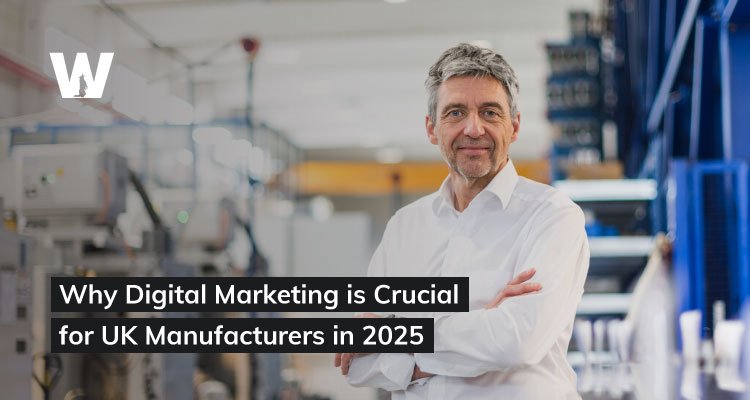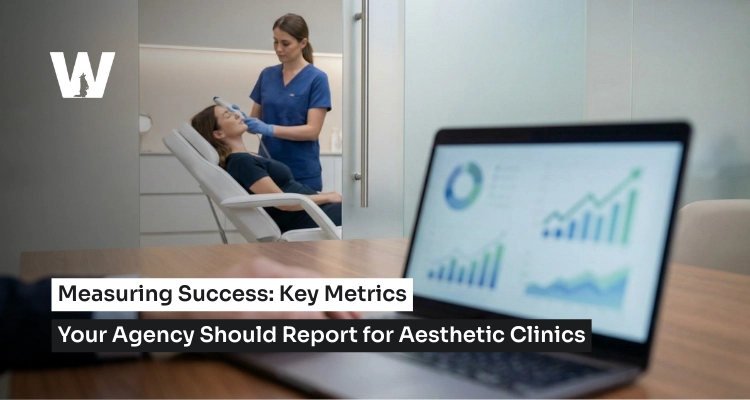Wraps up in 14 Minutes
UK manufacturers who ignore digital marketing in 2025 are losing 67% of potential customers before they even know your business exists. Meanwhile, competitors embracing digital strategies are capturing qualified leads at 40% lower costs whilst expanding into global markets. The question isn't whether you can afford to invest in digital marketing—it's whether you can afford not to.
Why Are UK Manufacturers Struggling to Compete Without Digital Marketing?
The UK manufacturing landscape has shifted dramatically. Post-Brexit trade complexities, ongoing supply chain disruptions, and an acute skills shortage have created unprecedented challenges.
Yet the biggest challenge isn't operational—it's visibility.
Here's the reality: 89% of B2B buyers research suppliers online before making contact. If your manufacturing business isn't digitally visible, you're invisible to most potential customers.
Traditional marketing methods that worked for decades now face significant limitations:
- Trade shows, cold calling, and print advertising capture less than 30% of modern buyer attention
- The remaining 70% of buyer engagement happens in digital spaces
- Competitors embracing digital strategies are capturing market share whilst traditional-only companies lose visibility
The Current State of UK Manufacturing in 2025
UK manufacturing faces a perfect storm of challenges. Brexit has complicated European market access, forcing companies to find new customers and suppliers. Supply chain disruptions continue affecting production schedules and customer relationships.
The skills shortage is particularly acute, with 73% of manufacturers reporting difficulty filling technical roles. This creates additional pressure to attract talent through digital channels where younger workers predominantly search for opportunities.
The opportunity? Digital marketing levels the playing field. Small and medium-sized manufacturers can compete globally using sophisticated targeting and automation tools previously available only to large corporations.
What Makes Digital Marketing Essential for UK Manufacturers in 2025?
B2B Buyer Behaviour Changed for Manufacturing Purchases
Modern industrial buyers behave nothing like their predecessors. Today's procurement professionals complete 67% of their buying process online before ever speaking to a sales representative.
This digital-first approach includes:
- Evaluating suppliers and comparing capabilities online
- Checking certifications and quality standards
- Building supplier shortlists through digital research
- Reviewing case studies and technical documentation
The generational shift is accelerating. Millennial and Gen Z decision-makers now represent over 60% of B2B purchasing committees. These buyers expect sophisticated digital experiences, detailed online product information, and immediate access to technical specifications.
Mobile research dominates early-stage buying. Over 80% of industrial buyers use smartphones and tablets to research suppliers during off-hours, weekends, and travel time.
COVID-19 Changed Manufacturing Marketing Needs
The pandemic permanently altered B2B sales processes. Remote selling became standard, virtual demonstrations replaced facility tours, and digital relationship-building became essential.
Supply chain transparency demands increased dramatically. Customers now expect real-time visibility into production schedules, quality processes, and delivery capabilities—all communicated through digital channels.
Digital transformation accelerated by 5-7 years overnight. Companies that previously resisted online marketing suddenly needed websites, social media presence, and digital communication tools to maintain customer relationships.
This acceleration created opportunities for digitally-prepared manufacturers whilst leaving traditional-only companies struggling to adapt.
How Can UK Manufacturers Leverage Digital Marketing for Lead Generation?
Best Performing Content Formats for Manufacturers
Technical content remains king in manufacturing marketing, but the format and distribution have evolved significantly.
High-performing content types include:
- White papers and case studies that demonstrate measurable ROI or solve specific industry challenges
- Video demonstrations and virtual facility tours showing equipment in operation and production processes
- Application notes and technical specification guides that serve as valuable lead magnets whilst optimising for long-tail keywords
When prospects download detailed technical information, they're indicating high purchase intent and readiness for sales engagement.
LinkedIn’s Role in B2B Manufacturing Growth
LinkedIn delivers 80% of B2B leads across all industries, but its impact in manufacturing is particularly pronounced. Engineers, procurement professionals, and operations managers actively use LinkedIn for professional development and supplier research.
The platform's professional context makes it ideal for sharing technical content, industry insights, and company updates without appearing overly promotional.
LinkedIn Sales Navigator provides unprecedented access to decision-makers in target companies. You can identify procurement managers, engineering directors, and operations heads at specific companies, then engage them with relevant content and direct outreach.
Effective LinkedIn strategies for manufacturers:
- Company page optimisation with technical capabilities and industry insights
- Employee advocacy programs that multiply reach through team members' professional networks
- LinkedIn Sales Navigator for targeted prospecting and relationship building
- Technical content sharing that positions your team as industry experts
Our social media marketing services help manufacturing clients build strategic LinkedIn presence, creating content calendars that balance technical expertise with business development objectives.
Using Google Ads to Reach Industrial Buyers
Google Ads for manufacturing requires a different approach than consumer marketing. Industrial buyers search using highly specific, technical terms that often have lower competition but higher conversion rates.
Key Google Ads strategies for manufacturers:
- High-intent technical keywords - Target specific product codes, technical specifications, and industry standards. Someone searching "ISO 9001 certified CNC machining Birmingham" shows clear purchase intent and geographic relevance.
- Geographic targeting precision - Focus campaigns on regions within your service capabilities whilst excluding areas outside your delivery zones. This maximises budget efficiency for local and regional manufacturers.
- Competitor bidding tactics - Appear when prospects search for competitors, keeping your company in consideration during supplier comparison processes. Manufacturing buyers typically evaluate multiple suppliers before deciding.
- Bing Ads opportunities - Often provide better value in industrial sectors due to lower competition and professional audience demographics. Microsoft's platform captures significant business user traffic at reduced costs.
Our social media marketing services help manufacturing clients build strategic LinkedIn presence, creating content calendars that balance technical expertise with business development objectives.
What Digital Marketing Channels Deliver the Best ROI for UK Manufacturers?
Email Marketing for B2B Manufacturing Companies
Email marketing consistently delivers 40:1 ROI for manufacturing companies, making it one of the most effective digital channels available. The extended sales cycles typical in manufacturing (6-18 months) make email nurturing essential for maintaining prospect engagement.
Key email marketing strategies for manufacturers:
- Technical newsletter content - Regular updates about industry trends, new capabilities, regulatory changes, and technical insights position your company as a knowledgeable partner rather than just a supplier.
- Product update campaigns - Generate significant engagement from existing customers, often leading to additional orders or service contracts. Keeping customers informed about new capabilities and certifications strengthens relationships.
- Trade show follow-up sequences - Automate post-event communication, ensuring leads don't slip through administrative cracks whilst your sales team focuses on high-priority prospects.
Manufacturers Automate For Marketing Processes
Marketing automation transforms how manufacturers manage complex, multi-stakeholder sales cycles. Automated systems can nurture dozens of prospects simultaneously whilst providing sales teams with qualified, engagement-scored leads.
Essential automation components:
- Advanced lead scoring - Considers company size, industry relevance, job title, content engagement, website behaviour, and inquiry specificity. This scoring helps sales teams prioritise follow-up activities and customise their approach.
- Persona-based nurture campaigns - Technical evaluators receive detailed specifications and case studies, whilst financial decision-makers get ROI analyses and total cost of ownership information.
- CRM integration - Ensures seamless handoffs between marketing and sales, with complete interaction history and engagement data available when sales representatives contact prospects.
Integrating Trade Shows with Digital Marketing
Modern trade shows blend physical and digital experiences. Virtual and hybrid events have become standard, requiring manufacturers to excel at both in-person and online engagement.
Digital trade show strategies:
- Pre-show marketing campaigns - Email campaigns, social media promotion, and targeted advertising build booth traffic and schedule qualified meetings whilst pre-qualifying attendees.
- Post-show automation - Ensures consistent communication with every lead captured. Automated sequences deliver promised information, schedule follow-up calls, and continue nurturing based on specific interests.
- Content repurposing - Extends trade show ROI by creating multi-channel content. Booth demonstrations become video content, presentations become downloadable resources, and conversations generate case study ideas.
How Much Should UK Manufacturers Invest in Digital Marketing?
Recommended Digital Marketing Budget for UK Manufacturers
Industry benchmarks vary based on growth objectives and market maturity. These percentages represent total marketing investment, including both digital and traditional channels, though successful manufacturers now dedicate 60-80% of their marketing budget to digital channels.
Digital marketing budget guidelines:
- Established manufacturers - 2-5% of revenue for companies with stable customer bases focusing on retention and steady growth.
- Growth-focused companies - 7-10% of revenue for manufacturers expanding into new markets or launching new products requiring increased visibility.
- Channel allocation shift - Modern manufacturers dedicate 60-80% of total marketing budget to digital channels, reflecting buyer behaviour changes.
- ROI timeframe expectations - SEO and content marketing deliver compound returns over 12-24 months, whilst paid advertising generates immediate results but requires ongoing investment.
Lead generation costs vary significantly based on product complexity, deal size, and market competition. Customer acquisition costs should be measured against lifetime value, which in manufacturing can span decades and often justifies higher upfront marketing investments.
Priority Digital Marketing Activities for UK Manufacturers
Foundation Level (Months 1-3) - Establishing Digital Presence
- Professional website optimisation - Ensures your online presence accurately represents capabilities whilst providing technical information buyers seek.
- Google My Business setup - Improves local visibility and provides essential business information appearing in search results and maps.
- Basic content creation - Company overview, capability statements, and case studies provide the foundation for ongoing digital marketing activities.
Growth Level (Months 4-12) - Lead Generation Focus
- Search engine marketing campaigns - Capture high-intent traffic from prospects actively searching for manufacturing solutions.
- LinkedIn advertising - Targets specific decision-makers in relevant companies with precision unavailable through traditional channels.
- Marketing automation implementation - Streamlines lead nurturing and sales follow-up processes, improving conversion rates whilst reducing manual administrative work.
Scale Level (Year 2+) - Advanced Tactics
- Advanced analytics and attribution - Provides detailed ROI measurement across channels and campaigns for optimisation decisions.
- Account-based marketing - Targets specific high-value prospects with personalised campaigns for complex, high-value sales.
- International market expansion - Leverages digital channels to reach global buyers cost-effectively without traditional geographic limitations.
What Digital Marketing Mistakes Cost Manufacturers the Most Money?
Website and SEO errors represent the most expensive mistakes. Slow loading speeds cost manufacturers an average of 35% of mobile traffic, as technical buyers won't wait for pages to load during research sessions.
Critical technical errors that lose leads:
- Slow loading speeds affecting mobile users who research suppliers during off-hours
- Missing technical product information forcing prospects to contact better-prepared competitors
- Poor local SEO optimisation missing regional opportunities where proximity matters
- Overly technical content without clear business benefits or ROI explanations
- Inconsistent publishing schedules that damage SEO performance and audience expectations
What Strategy Mistakes Do Manufacturers Make?
Lack of buyer persona definition leads to generic marketing messages that fail to resonate with specific decision-makers in the buying process. Manufacturing sales involve multiple stakeholders—technical evaluators, procurement managers, financial approvers—each requiring different information and communication approaches.
Insufficient lead qualification processes waste sales time on poor-quality prospects whilst high-quality leads receive delayed follow-up. Clear qualification criteria and automated scoring prevent these costly inefficiencies.
Poor integration between sales and marketing teams creates communication gaps, missed opportunities, and inconsistent messaging. Successful manufacturing companies align sales and marketing objectives, share lead quality feedback, and coordinate customer communication.
How Do You Measure Digital Marketing ROI in Manufacturing?
What KPIs Matter Most for Manufacturing Marketing?
Essential lead generation metrics:
- Marketing Qualified Leads (MQLs) - measuring marketing's ability to generate relevant prospects
- Sales Qualified Leads (SQLs) - indicating lead quality and sales team acceptance
- Lead conversion rates by channel - identifying which activities generate highest-quality prospects
- Pipeline velocity - tracking how marketing impacts sales cycle speed
Critical revenue metrics:
- Customer acquisition cost (CAC) - measuring marketing efficiency and channel performance
- Average deal size - indicating improvements in lead quality and targeting
- Sales cycle length changes - showing marketing's impact on sales velocity
High-quality leads with better pre-qualification typically move through sales processes more quickly, reducing overall customer acquisition costs.
What Tools Measure Manufacturing Marketing Success?
Google Analytics 4 setup for manufacturing requires custom goal configuration, conversion tracking, and attribution modelling that accounts for extended sales cycles and multiple touchpoints.
CRM integration provides complete customer journey visibility, from initial website visit through final purchase and ongoing relationship management.
Industrial-specific analytics platforms offer deeper insights into technical buyer behaviour, competitor analysis, and market trends relevant to manufacturing sectors.
At Wolfable, we implement comprehensive analytics frameworks that provide manufacturing clients with clear visibility into marketing ROI, lead quality trends, and channel performance optimisation opportunities.
Traditional vs. Digital Marketing for UK Manufacturers
| Aspect | Traditional Marketing | Digital Marketing |
|---|---|---|
| Reach | Limited to local/regional | Global accessibility |
| Cost Efficiency | Higher cost per lead | More cost-effective lead generation |
| Targeting Precision | Broad demographics | Specific job titles, companies, interests |
| Measurability | Difficult to track ROI | Real-time analytics and attribution |
| Response Time | Days to weeks | Minutes to hours |
| Content Longevity | Single-use campaigns | Evergreen, searchable content |
| Buyer Journey Support | Limited touchpoints | Multi-channel nurturing |
| Scalability | Linear cost increases | Exponential reach potential |
What New Digital Marketing Technologies Will Impact Manufacturing?
The Impact of AI on Manufacturing Marketing
Artificial Intelligence and Machine Learning revolutionise lead scoring by analysing hundreds of data points to predict purchase probability and timing. These systems identify patterns human marketers might miss, improving qualification accuracy and sales efficiency.
Chatbots for technical inquiries provide 24/7 customer service whilst qualifying leads and scheduling sales appointments. Advanced AI chatbots can answer complex technical questions, provide product recommendations, and escalate qualified prospects to human sales representatives.
Personalised content recommendations deliver relevant information based on individual prospect behaviour, company characteristics, and buying stage. This personalisation improves engagement rates and accelerates sales cycles.
The Role of AR and VR in Modern Manufacturing Marketing
Augmented and Virtual Reality technologies transform how manufacturers demonstrate complex products and capabilities. Virtual facility tours allow global prospects to experience production capabilities without travel costs and scheduling complications.
Remote equipment training becomes possible through VR, providing customer education and support that traditionally required on-site technical specialists.
Virtual trade show experiences extend event participation beyond physical limitations, allowing manufacturers to demonstrate capabilities to international audiences whilst reducing exhibition costs.
These technologies particularly benefit manufacturers with complex, expensive equipment that's difficult to transport or demonstrate in traditional sales environments.
Taking Action: Your Next Steps for Digital Marketing Success
Digital marketing isn't optional for competitive UK manufacturers in 2025. The companies winning market share are those embracing comprehensive digital strategies whilst competitors rely on outdated marketing approaches.
Start with foundation elements before scaling advanced tactics. A professional website, basic SEO, and Google My Business optimisation provide immediate improvements whilst building the platform for sophisticated campaigns.
Focus on measurable strategies with clear ROI. Every digital marketing pound should generate trackable leads, improved visibility, or enhanced customer relationships.
Ready to transform your manufacturing marketing? Wolfable specialises in digital marketing for UK manufacturers, combining technical expertise with proven marketing strategies. Our white label services can complement your existing team, whilst our comprehensive approach covers everything from WordPress development to advanced SEO campaigns.







